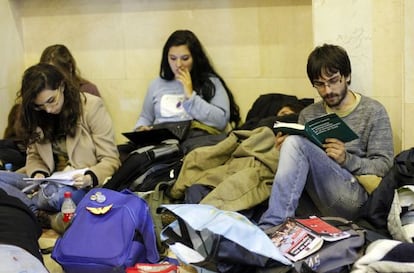Madrid students protest plan to exclude 3,500 for not paying fees
Undergraduates affected by crisis must pay by September or leave courses

Around 50 students at Madrid's Complutense University (UCM) began the fifth day of a sit-in protest on Tuesday, aimed at reversing the rectorate's decision to remove 3,500 undergraduates from the institute's virtual campus for non-payment of course fees. The affected alumni were eventually reinstated and told they could sit end-of-year exams, but with a caveat: their fees must be paid before September or they face expulsion from their courses, or will have to sign up again next year and pay double.
The 3,500 students have 10 days from next Monday to choose one of three payment methods: two payments in July and September; payment in four monthly installments from June to September; or a single payment in September. The situation was described by a university spokesman as "unprecedented."
At the beginning of the academic year the UCM warned of the consequences of fee hikes, which are 16 percent on average nationwide but 38 percent in Madrid. The criteria for obtaining grants were also toughened. Thousands of students received theirs halfway through the year while others await the outcome of appeals against initial denials of state aid. Many universities have set up a fund to bail out students in precarious financial situations.
Average fee hikes in Spain stand at 16 percent; in Madrid the rise is 38 percent
But the UCM says it is unable to do so: José Carrillo, the dean, had promised a million-euro fund to tackle the problem, but the crisis seems to have put paid to the scheme. The UCM is one of the most indebted universities in Spain, with negative figures of 142 million euros. On the other side of the coin, the regional government of Madrid has been gradually turning off the tap to its six public universities and in 2008 tore up a funding plan that ran to 2011. The UCM is now pursuing 62 million euros it calculates the regional administration owes it through the courts. If and when it arrives and its own debts have been cleared, some of that money will go toward helping its students. But that is not likely to happen in time for the 3,500 affected.
One of the reasons for non-payment is that many students do not yet know if they have been given a grant for 2012-13. The UCM blames the Education Ministry for the delay, which in turn says the necessary documentation has not been received.
Individual faculties have alerted the central government to the problems they face. One brilliant politics student faces exclusion as she can't pay a 300-euro fee. The Geography and History faculties face losing between 150 and 200 students, according to its head Luis Enrique Otero. None of the faculties can assume these debts themselves. "In our case it is impossible, because 300,000 euros is more than half of our budget for the year after cutbacks of 40 percent," says Otero.
In previous years, students were informed of non-payment by their faculties and given three chances to cover their fees before being thrown off their course. "Nobody came to us to say they couldn't pay because of the crisis, as is happening this year," says Otero.
The ultimatum issued by UCM for the end of May has been extended until September, but the university staff has asked that fees be modified so that students can pay the courses they have already sat and leave the rest for another time. The student body has called for the university fund to be activated so that nobody need be excluded and that the time frame for meeting fees be extended even further. They have also asked Carrillo to agree to carry over results of exams sat this year over to the next.
"This sit-in is getting results and we are on the right path to getting the help that many students need," said political sciences student Miguel Rodríguez after the protestors met with vice-rector María Encina González, who gave the green light to payment by installments.
Tu suscripción se está usando en otro dispositivo
¿Quieres añadir otro usuario a tu suscripción?
Si continúas leyendo en este dispositivo, no se podrá leer en el otro.
FlechaTu suscripción se está usando en otro dispositivo y solo puedes acceder a EL PAÍS desde un dispositivo a la vez.
Si quieres compartir tu cuenta, cambia tu suscripción a la modalidad Premium, así podrás añadir otro usuario. Cada uno accederá con su propia cuenta de email, lo que os permitirá personalizar vuestra experiencia en EL PAÍS.
¿Tienes una suscripción de empresa? Accede aquí para contratar más cuentas.
En el caso de no saber quién está usando tu cuenta, te recomendamos cambiar tu contraseña aquí.
Si decides continuar compartiendo tu cuenta, este mensaje se mostrará en tu dispositivo y en el de la otra persona que está usando tu cuenta de forma indefinida, afectando a tu experiencia de lectura. Puedes consultar aquí los términos y condiciones de la suscripción digital.








































